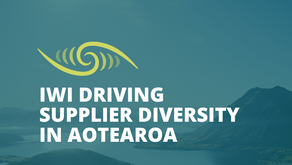The concept of supplier diversity has seen an increase in awareness across Aotearoa, recently bringing a significant shift towards equitable procurement practices within the commercial landscape.
Organisations like Amotai have been at the helm of raising the profile of supplier diversity. Through their engagement with local governments, the private sector, and Māori and Pasifika businesses, they've championed the need for diversification in supply chains, encouraging a procurement environment that values inclusivity.
A critical driving force in this movement are the Iwi entities who have taken a stance as both influencers and significant spenders in their respective rohe (regions). Committed to the economic well-being of their communities, Iwi are strategically directing spending towards whānau-owned enterprises, fostering regional economic development, and supporting the broader spectrum of Māori-owned businesses.
Iwi are significant Buyers
The economic worth of Iwi organisations in New Zealand is substantial. Over the years, Iwi organisations have been growing their asset base significantly, especially since the settlement of historical Treaty of Waitangi claims.
The settlements provided Iwi with a financial base to build from, and many have turned these into multi-million or even billion-dollar enterprises. Ngāti Whatua, Ngāi Tahu and Waikato Tainui are examples of Iwi that have reported assets valued at over $1billion each.
This wealth increases the commercial negotiating power of these entities but also places an emphasis on how their own procuring practice can create impact for their iwi economies.
Developing whānau owned businesses through procurement activity
Many Iwi across Aotearoa have integrated supplier diversity into their procurement policies and have established social procurement plans, strategies, and objectives.
Ngāti Kahungunu, for example, is utilising their K3 property development to not only engage existing Māori businesses as contractors but also to support the establishment of new ventures and assist in enhancing the capabilities of businesses needing extra support to meet increasing demands.
Meanwhile, Taranaki Iwi are creating a collective to enable whānau businesses to compete for and win larger work packages in the region.
To facilitate targeted procurement, Iwi such as Waikato Tainui, Ngāti Toa and Ngāi Tahu have compiled comprehensive registers of whānau-owned businesses with whakapapa ties to their Iwi. These databases are used as sources of supply as well as a way to support their capability development.
Iwi advocacy for Māori outcomes
The assertiveness of Iwi is evident in the actions of many mana whenua partnerships with government agencies, who continuously apply pressure to ensure that local iwi, hapu and whānau businesses are given precedence and that publicly funded projects deliver tangible social outcomes for local communities.
Iwi are resolute in pressing for the realisation of community benefits.
The opportunity for Iwi to set new benchmarks
While many Iwi are conscious of and actively engaging in supplier diversity and social procurement initiatives, there is scope to expand these efforts. With considerable financial resources, a clear mandate, and a strong motivation, Iwi are well-positioned to surpass the current government targets, which call for 8% of contracts to be awarded to Māori businesses. Indeed, for Iwi who have settled their Treaty claims, especially those who have had settlement assets for a number of years, there is a tangible opportunity to aim for spending proportions that exceed the Māori population representation of 17%.
Furthermore, Iwi have the ability to set ambitious social outcome targets for the contractors with whom they undertake commercial developments. By doing so, they can ensure that their economic activities also yield substantial social benefits, reinforcing the dual goals of financial success and social responsibility.
Conclusion
Supplier diversity is a confluence of commercial and social interests— a no brainer for Iwi.
Iwi have substantially increased their economic standing, establishing themselves as key purchasers with a focus on impactful procurement. Beyond their own spending, they exert influence on other major projects to ensure the creation of enduring benefits for Māori communities.
References
https://www.nzta.govt.nz/projects/te-ara-tupua/mana-whenua-partnership/
https://ngaitahu.iwi.nz/runanga/puna-pakihi/
https://waikatotainui.com/hapori/social-procurement/
https://www.k3property.co.nz/our-pou/blog-steve-baker
https://www.ngatitoa.iwi.nz/ecod
This work is licensed under a Creative Commons Attribution-NonCommercial-ShareAlike 4.0 International License


